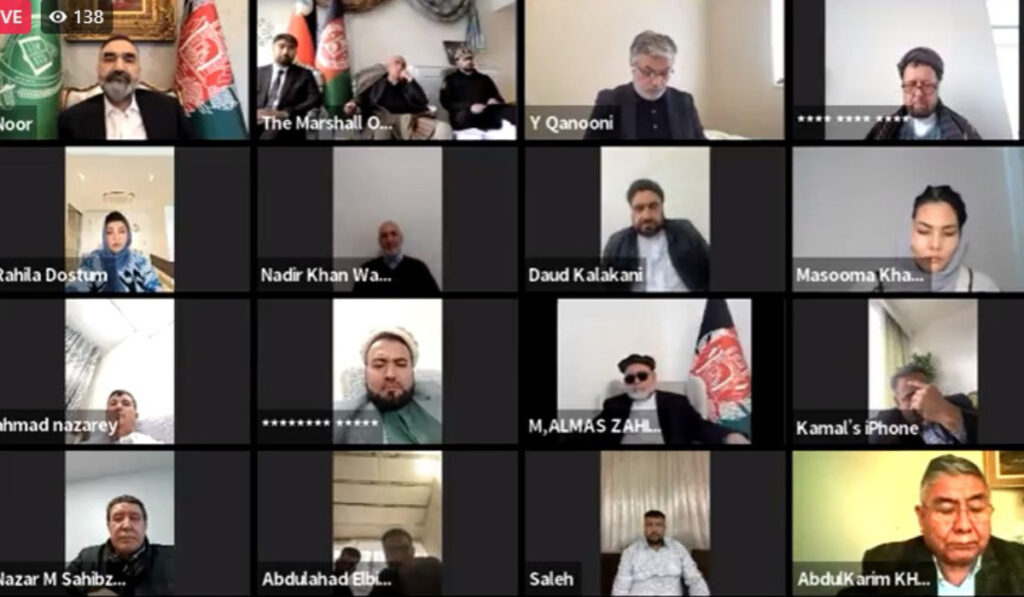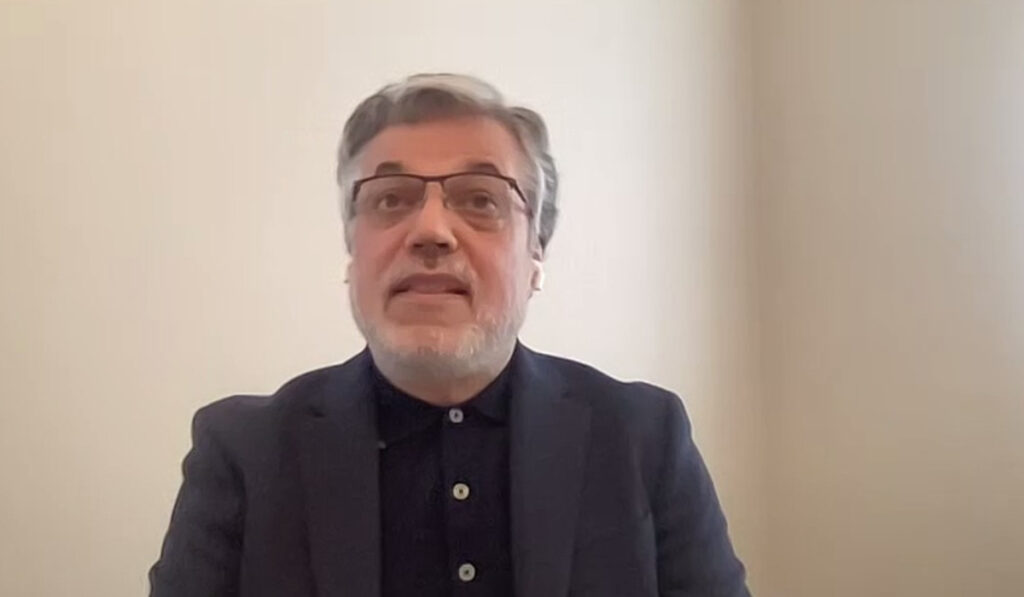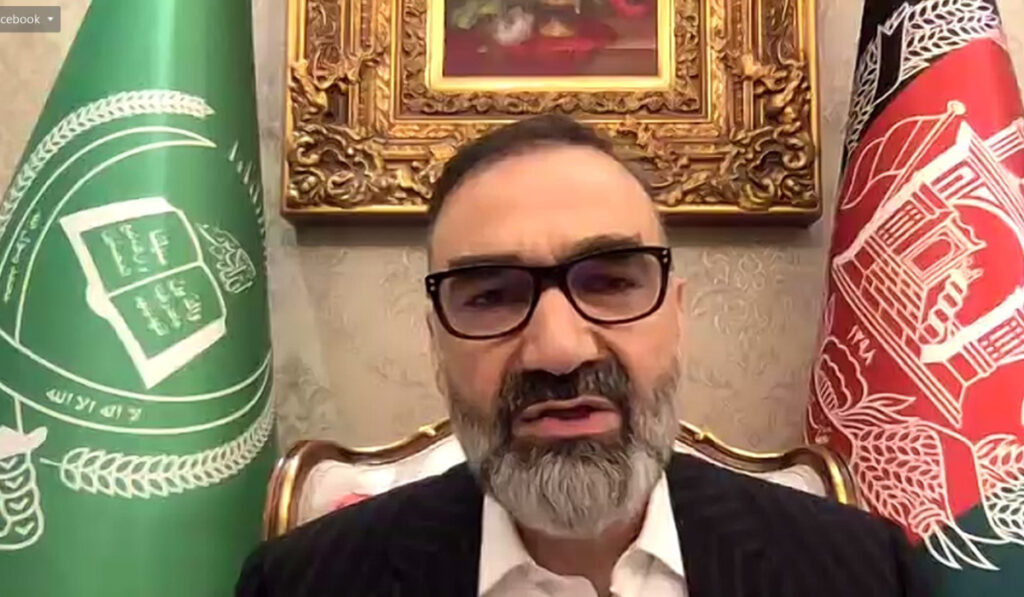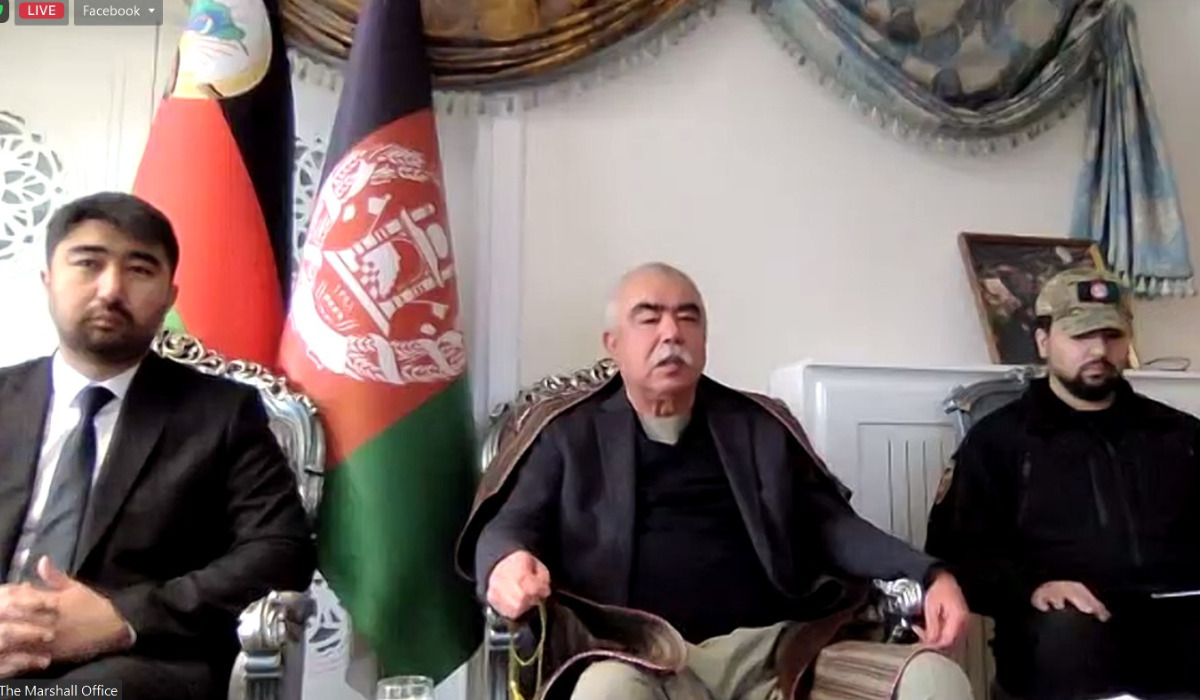The National Resistance Council for the Salvation of Afghanistan made suggestions in an online meeting on Sunday as part of a plan to save the country and recommended both political and military solutions and also proposed various phases to reach its goals.
The National Resistance Council for the Salvation of Afghanistan said it believes that the people of Afghanistan and the world can save Afghanistan from the crisis it is experiencing by creating a collective will and launching sincere political efforts before it is too late and all opportunities for political understanding are lost.
This process can protect the lives and safety of the citizens of the countries of the region and the world from reliving the bitter experience of terrorist attacks emanating from Afghanistan, the council noted.
The council, which is comprised of former politicians, including former vice president Yunus Qanouni, former Balkh governor Ata Mohammad Noor, as well as Mohammad Mohaqeq and others, said its goals include the following:
1. Ending the war and violence and transitioning from the current unfavorable situation to a favorable situation.
2. Establishing a new Afghanistan free from war and violence, which is pluralistic, democratic, justice-oriented, free of discrimination and prejudice, guided by a true and moderate interpretation of Islamic values and subject to the rule of law.
3. Converting deadly armed rivalry into healthy political and civil competition through program-focused and lawful political parties.
4. Ensuring permanent stability, balanced development and universal prosperity.
5. Adopting a new constitution, which returns sovereignty to the people, by restraining and institutionalizing government power within the framework of a decentralized parliamentary democracy with elected governors, mayors and district governors.
6. Restoring Afghanistan’s position and constructive role in the region and the world by adopting a stance of active neutrality and the principle of mutual respect.

To provide conditions for the talks, the council suggests that at national level, there is a need for the creation of a single umbrella for the main political forces opposed to the Taliban.
It also suggests that there is a need for agreement on a joint framework for efforts to save the country and a need for agreement on the road map out of the crisis.
It also proposes agreement on the future political system of the country, which will guarantee stability, development, prosperity and social justice for all the country’s citizens and ensure that Afghanistan cannot slide back into war and conflict; and for the establishment of a specific address to facilitate communication with all parties.
On the international level, the council says the United Nations should appoint a competent delegation to initiate and manage the peace process and lay the groundwork for negotiations and take the following steps:
1. Create a common understanding of the Afghan crisis and the unfortunate real consequences it has on the people, the region and the world, taking into account the increasing presence of extremist groups in Afghanistan.
2. Establish coordination among the neighboring countries, the region and the world, based upon restoration of stability in Afghanistan and transforming the country from being a locus of conflicting interests to one of converging interests for the concerned countries. And thus create a collective will to solve the political crisis in Afghanistan.
3. Enlist the support of the Taliban group and the key forces opposed to it for the proposed roadmap.
4. Support the opponents of the Taliban, opening an official office in an appropriate country location, with representative offices in other countries.
5. Select the negotiating teams from the Taliban and their opponents with due consideration to social, gender, linguistic, ethnic, geographic and religious diversity and the active participation of women and youth.
6. Determining the time and the location of the negotiations in a neutral country.

The council says that another option is to increase pressure on the Taliban to agree to negotiations, and if the group refuses to accept the rightful demands of the Afghan people and a political solution and continues to wage war and violence against the people, the following options will be on the table for increasing pressure on the Taliban to accept the national reconciliation process:
National level
1. Systematic strengthening and expansion of national resistance in multiple provinces of the country, as a legitimate option in defense of the people’s rights and deliverance of the country.
2. Launching a campaign of civic action, mass protests and civil disobedience.
3. Paralyzing the illegitimate administrative machine of the Taliban in the capital and provinces, to protect the country’s suffering people from harm.
4. Supporting moderate Taliban factions and welcoming them into the national reconciliation process.
At international level the council suggests that the international community should:
1. Continue to prevent the de jure recognition of the Taliban’s illegitimate rule.
2. Cut off financial aid to the Taliban in such a way that the people of Afghanistan do not suffer.
3. Add warmongers, extremists and those involved with terrorist groups to the UN Security Council sanctions list.
4. Forcing the Taliban group to stop cooperating with foreign terrorists and expel them from Afghanistan.
5. Imposing more sanctions on the trips of Taliban leaders abroad.
6. Encouraging the countries that support the Taliban to convince this group to accept the process of national reconciliation.
7. Supporting the Anti-Taliban Governance Groups
When the peace talks start, the council suggests that discussions and decisions should be on the following agenda:
1. Discussion and agreement on the formation of a transitional government for a period of two years with specific tasks.
2. Agreement on the structure of the transitional government (the State High Council, the head of State and his deputies, the prime minister and his deputies, the interim cabinet, the president and members of the Supreme Court, the Supreme Council of Islamic Jurisprudence and independent directorates)
3. Agreement on the appointment of candidates to all senior positions mentioned in clause 2 above.
4. Discussion and agreement on a national Salvation plan to save Afghanistan from Further Crisis.
5. Discussion and agreement on how to collect weapons and military equipment from all irresponsible individuals and groups and hand them over to the security forces.
6. Discussion and agreement on how to rebuild the defense and security forces of the Country.
The council suggests an elected government and the commencement of an era of building a new Afghanistan.

In this case, Afghanistan will have the following commitments:
1. A commitment based on full implementation of the peace agreement.
2. Establishing sound and efficient government institutions which respect the country’s ethnic, religious and gender diversity.
3. Respecting the fundamental rights of citizens, especially women, and seriously fighting corruption, preventing drug cultivation and trafficking.
4. Preventing the presence and entry of people affiliated with terrorist groups into Afghanistan.
5. Strengthening freedom of expression, free media, private sector and civil society institutions.
6. Obligation to comply with international conventions and covenants which Afghanistan has joined.
The international community’s commitments:
1. Broad support for the full implementation of the peace agreement.
2. Establishing a monitoring mechanism (8+2) including the European Union and the Organization of Islamic Cooperation (OIC), under the supervision of the United Nations Security Council (UNSC).
3. Funding the initial budget of the transitional government, especially for the reconstruction of the defense and security forces, the education sector, development projects and economic infrastructure of the country.
The council meanwhile stated that details of a National Reconciliation Plan will be completed and presented after it has been put forward for opinions and viewpoints from a range of groups, organizations, personalities, political, civil and human rights activists, women, youth and knowledgeable citizens of the country.
Council’s members
Abdul Rashid Dostum, head of the National Islamic Movement of Afghanistan, who addressed the session stressed the need for talks and asked the Taliban to enter negotiations to end the current crisis in the country.
Mohammad Mohaqeq in an online session said engagement with the Taliban will harm countries in the region. He asked the international community to review its engagement with the Taliban.
Mohaqeq thanked the international community for not recognizing the Taliban but said some countries have indirectly “recognized” the Taliban.
Former Balkh governor Atta Mohammad Noor in an online session said the international community has prevented them from political activities and has not allowed them to open an office abroad.
Noor blamed the international community, US and NATO for the current situation in Afghanistan and said that efforts are underway to “soften Taliban’s image” and move towards their recognition.





